Ethnic groups in Nigeria
Ethnic groups in Nigeria was established in , Built by in .
Nigeria is truly a fascinating country with 36 States and a Federal capital territory. It has over 300 ethnic groups and over 500 Spoken Languages, the official Language in Nigeria is English. Described as 'Giant of Africa' Nigeria borders the Republic of Benin, Chad, Cameroon and the Niger Republic. Due to the large population, distinct culture and economic achievements the actual record of the ethnic groups in Nigeria is not a surety. The largest, most populous and politically influenced ethnic group in Nigeria: Hausa, Yoruba, Igbo, Ijaw, Kanuri and Ibibio. Within these groups, there are minor groups with different languages, culture and lifestyle. Large population and diverse culture, despite this Nigeria, stand united.
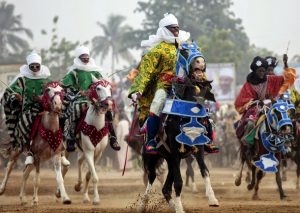 The Hausas are the largest ethnic group and makes up 25% of the Nigerian population and speak the Hausa language. Found in the North and Northwestern region of Nigeria, The Hausa culture is similar throughout the country. Their main religion is Islam with 99.9% practising Muslims and 0.10% Christians. Despite being the main players in the Nigerian politics their main occupation is farming, trading and cattle rearing.
The Hausas are the largest ethnic group and makes up 25% of the Nigerian population and speak the Hausa language. Found in the North and Northwestern region of Nigeria, The Hausa culture is similar throughout the country. Their main religion is Islam with 99.9% practising Muslims and 0.10% Christians. Despite being the main players in the Nigerian politics their main occupation is farming, trading and cattle rearing.
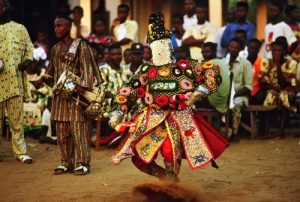 The Yoruba people are an ethnic group that constitutes 21% of the Nigerian population making them the second largest group. Yoruba people practice Christianity and Islam although some of them still uphold their ancestors' traditional religion and beliefs. Cultural traditions including music, cultural festivals, traditional Yoruba arts and architecture are still very much treasured by this group. The Yoruba culture depends on large population occupying the Southwestern and North-central part of Nigeria as well as an Oba (King).
The Yoruba people are an ethnic group that constitutes 21% of the Nigerian population making them the second largest group. Yoruba people practice Christianity and Islam although some of them still uphold their ancestors' traditional religion and beliefs. Cultural traditions including music, cultural festivals, traditional Yoruba arts and architecture are still very much treasured by this group. The Yoruba culture depends on large population occupying the Southwestern and North-central part of Nigeria as well as an Oba (King).
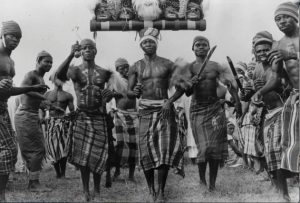 Ibo or Igbo, the primary language of the Igbo people located in the Southeastern part of Nigeria. They are mainly traders although some of them engage in handiwork and formal education. The 'Nigerian pidgin English' often replaces the Igbo language which started in the 9th century and spreads across Nigeria due to their trading. With the Biafra movement, the Igbo people consistently and unsuccessfully sought independence from Nigeria. Unlike the Hausa and Yoruba, Igbo society does not rely on a centralized society and is unordered. Igbo people form 18% of Nigeria's population.
Ibo or Igbo, the primary language of the Igbo people located in the Southeastern part of Nigeria. They are mainly traders although some of them engage in handiwork and formal education. The 'Nigerian pidgin English' often replaces the Igbo language which started in the 9th century and spreads across Nigeria due to their trading. With the Biafra movement, the Igbo people consistently and unsuccessfully sought independence from Nigeria. Unlike the Hausa and Yoruba, Igbo society does not rely on a centralized society and is unordered. Igbo people form 18% of Nigeria's population.
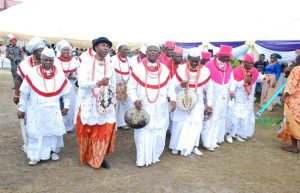 They are a group of people popular for their beautiful culture, food and attire. The Ijaws are an assembly of people native to the Niger Delta living in States like Edo, Bayelsa, Rivers and Ondo making up 10% of the population. Their lands are known to be extremely rich in oil leading to oil explorations which have left their land ecologically unsafe. The primary source of livelihood of the local people is Fishing and farming. Notwithstanding that majority are Christians, ancient worship of water spirits called Owuamapu is still practised.
They are a group of people popular for their beautiful culture, food and attire. The Ijaws are an assembly of people native to the Niger Delta living in States like Edo, Bayelsa, Rivers and Ondo making up 10% of the population. Their lands are known to be extremely rich in oil leading to oil explorations which have left their land ecologically unsafe. The primary source of livelihood of the local people is Fishing and farming. Notwithstanding that majority are Christians, ancient worship of water spirits called Owuamapu is still practised.

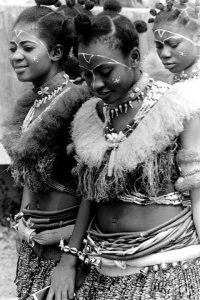 This ethnic group numbers roughly 4 million that is 3.5% of the population of Nigeria. The Ibibio is the most ancient of all the ethnic groups in the region besides this, they have an amazing artistic culture of wooden carvings, weaving, and masks making. Their occupation being farming for people living in the highland and Fishing for those in the riverine areas the Ibibio people are predominantly Christians. The Ibibio people of Akwa Ibom State also speak Anaang, Efik and Ibeano asides the native Ibibio language. One noticeable culture of the Akwa Ibom people is the 'fattening room' an ancient practice where young ladies are transformed to elegant and graceful women in preparation for marriage/womanhood.
This ethnic group numbers roughly 4 million that is 3.5% of the population of Nigeria. The Ibibio is the most ancient of all the ethnic groups in the region besides this, they have an amazing artistic culture of wooden carvings, weaving, and masks making. Their occupation being farming for people living in the highland and Fishing for those in the riverine areas the Ibibio people are predominantly Christians. The Ibibio people of Akwa Ibom State also speak Anaang, Efik and Ibeano asides the native Ibibio language. One noticeable culture of the Akwa Ibom people is the 'fattening room' an ancient practice where young ladies are transformed to elegant and graceful women in preparation for marriage/womanhood.
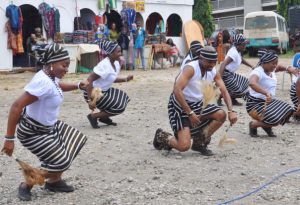 Tiv people also called Tivi have a complex, unique and fascinating culture especially with their fashion style (A'nger material) a combination of interwoven black and white striped material. Their main source of livelihood is agricultural produce and trading of this product. This makes agriculture their only source of income. They have a rich history associated with their existence as well as a rich cultural heritage. Found in Benue state, they make up 2.5% of the population.
Tiv people also called Tivi have a complex, unique and fascinating culture especially with their fashion style (A'nger material) a combination of interwoven black and white striped material. Their main source of livelihood is agricultural produce and trading of this product. This makes agriculture their only source of income. They have a rich history associated with their existence as well as a rich cultural heritage. Found in Benue state, they make up 2.5% of the population.
 [table id=14 /]
[table id=14 /]

Major Ethnic Groups in Nigeria
Hausa

Yoruba
 The Yoruba people are an ethnic group that constitutes 21% of the Nigerian population making them the second largest group. Yoruba people practice Christianity and Islam although some of them still uphold their ancestors' traditional religion and beliefs. Cultural traditions including music, cultural festivals, traditional Yoruba arts and architecture are still very much treasured by this group. The Yoruba culture depends on large population occupying the Southwestern and North-central part of Nigeria as well as an Oba (King).
The Yoruba people are an ethnic group that constitutes 21% of the Nigerian population making them the second largest group. Yoruba people practice Christianity and Islam although some of them still uphold their ancestors' traditional religion and beliefs. Cultural traditions including music, cultural festivals, traditional Yoruba arts and architecture are still very much treasured by this group. The Yoruba culture depends on large population occupying the Southwestern and North-central part of Nigeria as well as an Oba (King).
Igbo
 Ibo or Igbo, the primary language of the Igbo people located in the Southeastern part of Nigeria. They are mainly traders although some of them engage in handiwork and formal education. The 'Nigerian pidgin English' often replaces the Igbo language which started in the 9th century and spreads across Nigeria due to their trading. With the Biafra movement, the Igbo people consistently and unsuccessfully sought independence from Nigeria. Unlike the Hausa and Yoruba, Igbo society does not rely on a centralized society and is unordered. Igbo people form 18% of Nigeria's population.
Ibo or Igbo, the primary language of the Igbo people located in the Southeastern part of Nigeria. They are mainly traders although some of them engage in handiwork and formal education. The 'Nigerian pidgin English' often replaces the Igbo language which started in the 9th century and spreads across Nigeria due to their trading. With the Biafra movement, the Igbo people consistently and unsuccessfully sought independence from Nigeria. Unlike the Hausa and Yoruba, Igbo society does not rely on a centralized society and is unordered. Igbo people form 18% of Nigeria's population.
Ijaw
 They are a group of people popular for their beautiful culture, food and attire. The Ijaws are an assembly of people native to the Niger Delta living in States like Edo, Bayelsa, Rivers and Ondo making up 10% of the population. Their lands are known to be extremely rich in oil leading to oil explorations which have left their land ecologically unsafe. The primary source of livelihood of the local people is Fishing and farming. Notwithstanding that majority are Christians, ancient worship of water spirits called Owuamapu is still practised.
They are a group of people popular for their beautiful culture, food and attire. The Ijaws are an assembly of people native to the Niger Delta living in States like Edo, Bayelsa, Rivers and Ondo making up 10% of the population. Their lands are known to be extremely rich in oil leading to oil explorations which have left their land ecologically unsafe. The primary source of livelihood of the local people is Fishing and farming. Notwithstanding that majority are Christians, ancient worship of water spirits called Owuamapu is still practised.
Kanuri
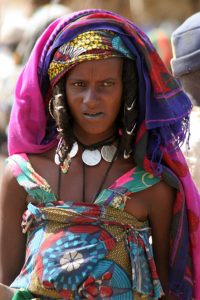

Ibibio
 This ethnic group numbers roughly 4 million that is 3.5% of the population of Nigeria. The Ibibio is the most ancient of all the ethnic groups in the region besides this, they have an amazing artistic culture of wooden carvings, weaving, and masks making. Their occupation being farming for people living in the highland and Fishing for those in the riverine areas the Ibibio people are predominantly Christians. The Ibibio people of Akwa Ibom State also speak Anaang, Efik and Ibeano asides the native Ibibio language. One noticeable culture of the Akwa Ibom people is the 'fattening room' an ancient practice where young ladies are transformed to elegant and graceful women in preparation for marriage/womanhood.
This ethnic group numbers roughly 4 million that is 3.5% of the population of Nigeria. The Ibibio is the most ancient of all the ethnic groups in the region besides this, they have an amazing artistic culture of wooden carvings, weaving, and masks making. Their occupation being farming for people living in the highland and Fishing for those in the riverine areas the Ibibio people are predominantly Christians. The Ibibio people of Akwa Ibom State also speak Anaang, Efik and Ibeano asides the native Ibibio language. One noticeable culture of the Akwa Ibom people is the 'fattening room' an ancient practice where young ladies are transformed to elegant and graceful women in preparation for marriage/womanhood.
Tiv
 Tiv people also called Tivi have a complex, unique and fascinating culture especially with their fashion style (A'nger material) a combination of interwoven black and white striped material. Their main source of livelihood is agricultural produce and trading of this product. This makes agriculture their only source of income. They have a rich history associated with their existence as well as a rich cultural heritage. Found in Benue state, they make up 2.5% of the population.
Tiv people also called Tivi have a complex, unique and fascinating culture especially with their fashion style (A'nger material) a combination of interwoven black and white striped material. Their main source of livelihood is agricultural produce and trading of this product. This makes agriculture their only source of income. They have a rich history associated with their existence as well as a rich cultural heritage. Found in Benue state, they make up 2.5% of the population.
Minor Ethnic Groups in Nigeria
Fulani
A small nomadic population the Fulani people are also called 'fula' or 'fulbe'. Their main occupation is pasture farming and nomadic women make handicrafts, weaving and knitting. They occupy most of the Hausa states and practice Islam.Itsekiri
The Itsekiri are an ethnic group of ancient part of the Niger Delta area, Delta state. With 90% practising Christianity though some of them are Muslims and are found across states like Edo, Warri and Ondo. They are mostly Traders and Fishermen.Igala
Mainly seen in Kogi state the Igala people speak Igala language and are practice both Christianity and Islam. They name their ruler Atah.Idoma
The Idoma people have a fascinating culture and inhabit 9 local government in Benue State. The Idoma people have valued and preserved their tradition and culture over time. A number of this culture is seen in their traditional rites, music, varied culture as well as their artistic expressions.Efik
Found mainly in Cross River state the Efik people known not only for their tasty 'Edikang Ikong' soup but also for their rich and interesting cultural heritage. This culture is manifested through the Ekombi dance, a colourful dance that depicts the rhythmic movement of the sea waves as well as their cultural festivals. The Efik language is a Benue-Congo language of the Cross River family, an official language of the settlers.Despite domination by the majority groups other Minor ethnic groups in Nigeria are;Urhobo, Gbagyi, Nupe, Anaang, Berom, Esan, Jukun, Kilba, Ogu, Mumuye, Tarok, Chamba, Ikwere, Ogoni, Igede, Kalabari, Baribu, Ika, Nupe, Isoko as well as many others. [table id=14 /]
[table id=14 /]